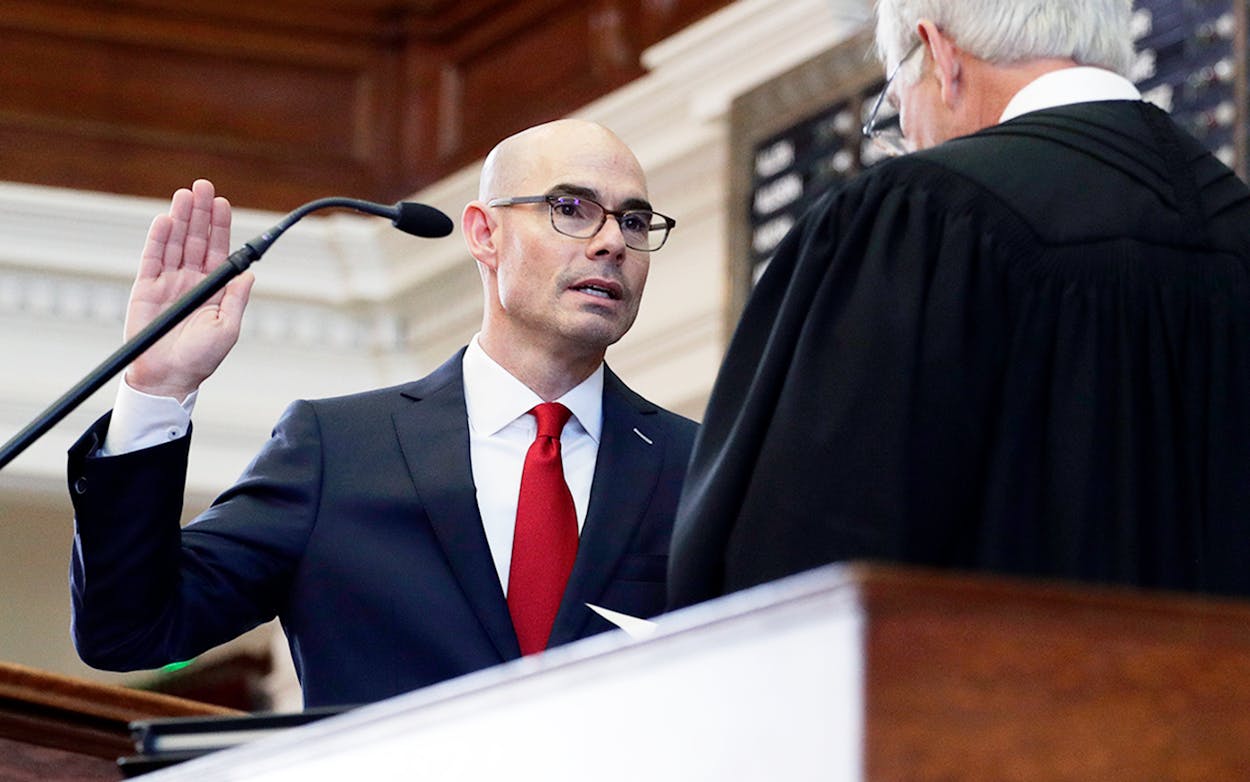So much for a kumbaya session. For most of the 86th Texas Legislature, things proceeded in an almost refreshingly dull fashion. Just a week ago, Ross Ramsey of the Texas Tribune—or at least his headline writer—called it an “unexciting, no drama, very humdrum session.” What a difference a week makes. The generally harmonious atmosphere—fostered in part by an election that scared the GOP as well as the focus on complex but important issues such as school finance and property taxes—has now been thoroughly poisoned by a slew of culture-wars legislation that animates social conservatives and angers Democrats.
Even one of the Legislature’s notorious trolls seemed to be perturbed by the turn of events. On Monday, Representative Jonathan Stickland, R-Bedford, tweeted that he wanted the Lege to get back to business:
We’ve passed countless bills that do nothing but reaffirm current law and the Constitution. Meanwhile we have nothing that brings significant property tax relief. This is not acceptable. #txlege
— Jonathan Stickland (@RepStickland) May 20, 2019
Discussion over what to do about rising property taxes and a broken school finance system marked most of the legislative session. Governor Greg Abbott, Lieutenant Governor Dan Patrick, and House Speaker Dennis Bonnen made a point to show that they were unified in getting something done on both fronts. The culture wars—embodied by the circus in 2017 over Patrick’s “bathroom bills”—seemed to have cooled. Social conservatives seemed cowed by how poorly many of their stalwarts fared in November.
The kumbaya-spoiler came Friday in the form of Senate Bill 22, which forbids local government from partnering with abortion providers like Planned Parenthood, even for services that have nothing to do with abortion. The bill received tentative approval in the House late Friday after six hours of contentious debate. (Because of an amendment tacked onto the bill, the Senate must reconsider the legislation before sending it onto Abbott, who has said he welcomes anti-abortion legislation.)
The decision by Bonnen and his lieutenants to schedule the debate led to a level of tension that had not been seen all session. At one point, the House sponsor of SB 22, Representative Candy Noble, R-Allen, refused to allow Democrats to even ask her questions; in a twist on the old “mic drop” maneuver, she simply walked away from the front microphone where those sponsoring legislation typically stand to take questions—a move that Representative Rafael Anchía, D-Dallas, called “a lack of professional courtesy.”
Across the rotunda, in the Senate, Patrick also lost patience with how SB 22 had bogged down the legislative calendar. Patrick accused Democrats of using a venerable Lege tactic called “chubbing” to slow-walk SB 22. (Chubbing is when you deliberately drag out debate by endlessly talking about a bill; it often imperils other nonrelated bills late in the session.) At one point early Friday afternoon, Patrick declared that no more House bills would be considered in his chamber until more Senate bills were passed in the House. “We can’t let Senate bills die as they take five, six, seven hours for one bill,” Patrick declared.
Then, on Monday, the House passed legislation, largely along partisan lines, that LGBTQ advocates, including the five members of the newly formed House LGBT Caucus, say perpetuates discrimination. The so-called Chick-fil-A bill would forbid governmental entities from taking “adverse action” against individuals based on their religious affiliations. Though its author, Representative Matt Krause, R–Fort Worth, made changes to accommodate critics—for example, by removing a provision that would have allowed Texas Attorney General Ken Paxton to sue local governments for alleged religious discrimination—the LGBTQ caucus said the measure was a thinly disguised effort to ratchet up fear of LGBTQ people.
Despite the ugly turn in the House, some Democrats say Bonnen is doing his best to manage a fractious body, following the Joe Straus model of allowing the “will of the House” to prevail.
“He has allowed the body to take its course,” said Representative César Blanco, D–El Paso. “When things become too emotional, he’s done a good job of gaveling them down.”
Still, Monday’s debate ended, quite literally, in tears. “This has gotten personal,” said Representative Celia Israel, D-Austin, as she tearfully spoke out against the legislation. It passed 79–62.
- More About:
- Politics & Policy
- Abortion
- Greg Abbott
- Dennis Bonnen
- Dan Patrick
- Austin






